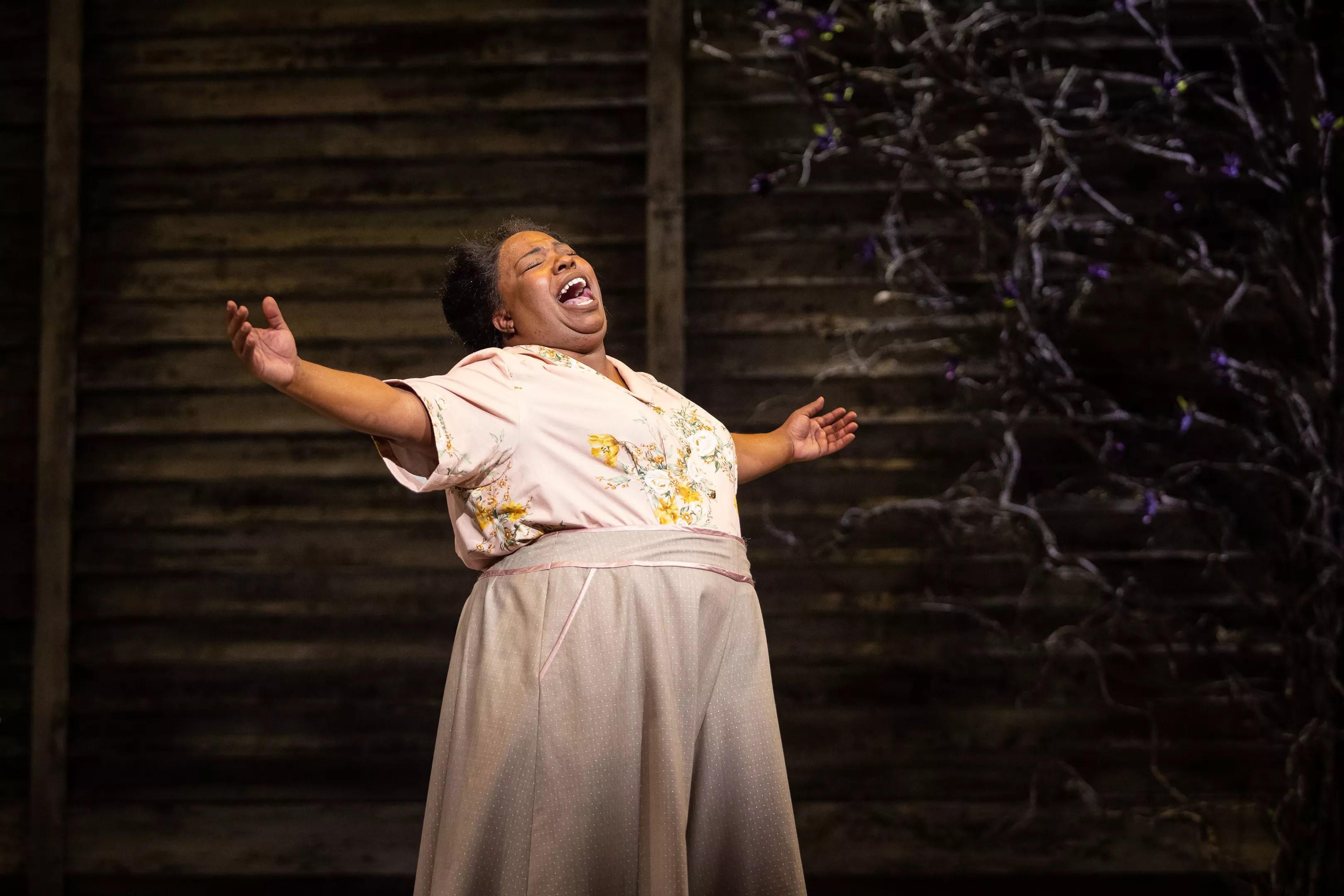
Photo Courtesy of Jamie Kraus Photography

Audio By Carbonatix
“I first read the book [The Color Purple, by Alice Walker] when it came out while I was in drama school, and had never read anything like it,” says Timothy Douglas, director of the musical adaptation of The Color Purple by the Denver Center for the Performing Arts Theatre Company. “The entire thing is Celie’s conversation with God; it was so arresting, and inspired my imagination with a story that I felt was very theatrical from a first read.”
Walker’s heartbreaking story about a young Black woman living in rural Georgia during the early 1900s was published in 1982. The Color Purple is told through letters Celie writes to God that chronicle her traumatic home life and struggle for freedom.
Celie is raped by her father, has her babies taken from her and is married to an abusive husband. Despite the men in her life taking advantage of her, Celie’s resilience gives her the strength to fight for her independence and restart her life. The novel won the National Book Award for Fiction and the Pulitzer Prize for Fiction in 1983, making Walker the first Black woman to win the prize.
“The book taps into an aspect of Black life that I haven’t experienced, but is related to things my family, who lived in the South, have talked about,” says Douglas. “I had a close connection to the story because of my ancestors. When I originally read the book, I actually remember crying, which hadn’t happened to me before.”
Following the success of Walker’s book, the story was adapted into a 1985 film directed by Steven Spielberg that featured the talents of Whoopi Goldberg, Danny Glover and Oprah Winfrey; the film was nominated for eleven Academy Awards.
Believing the narrative would translate well to the stage, producers Scott Sanders, Quincy Jones, Harvey Weinstein and Winfrey worked with composers Stephen Bray, Brenda Russell and Allee Willis, as well as book writer Marsha Norman, to create a musical adaptation of The Color Purple. When the production opened at the Broadway Theatre in New York City on December 1, 2005, it was nominated for eleven Tony Awards, with LaChanze winning Best Actress in a Musical for her performance as Celie.
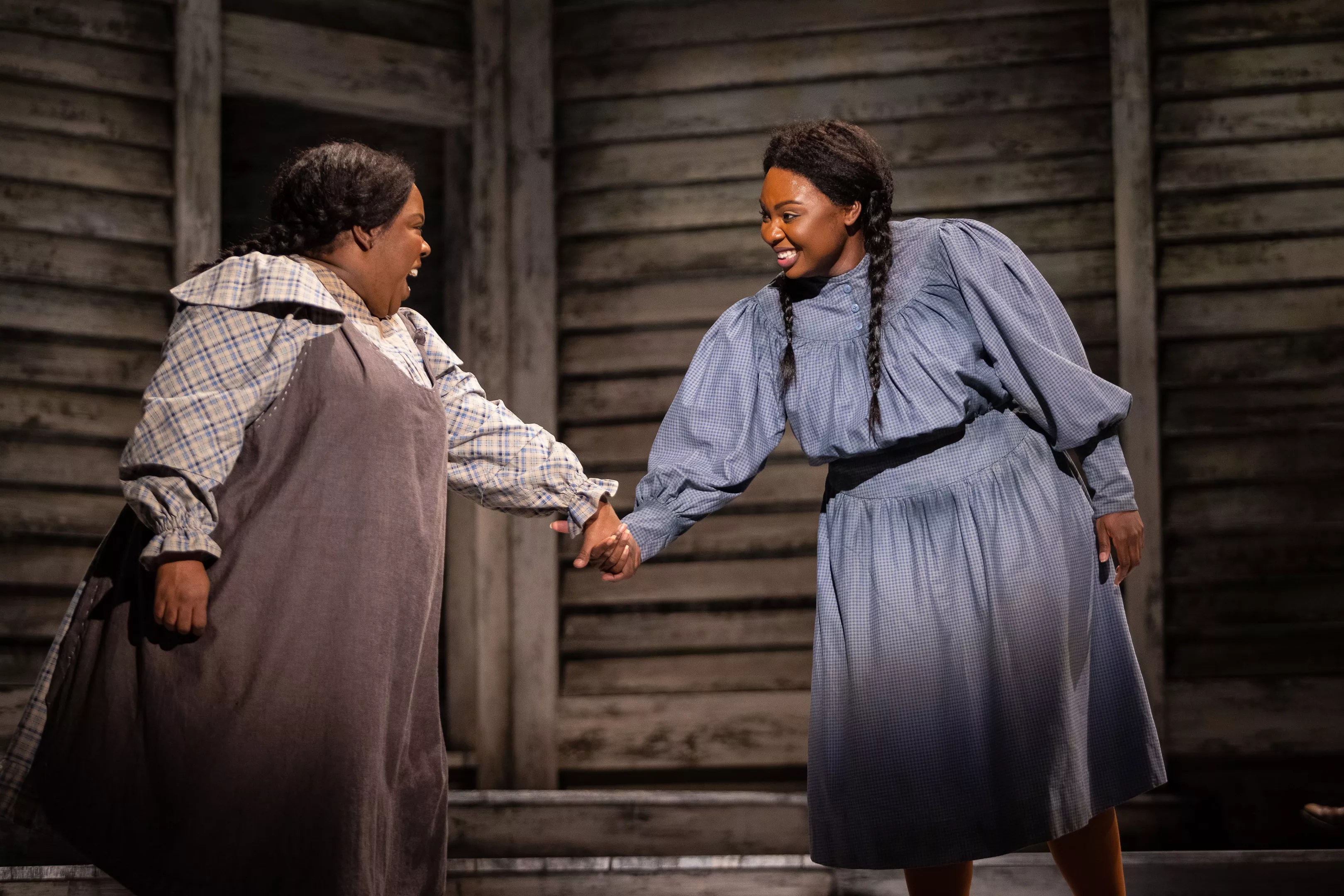
Maiesha McQueen and Elexis Morton clasp hands in the DCPA’s The Color Purple.
Photo Courtesy of Jamie Kraus Photography
John Doyle revived the musical in 2016, first at the Chocolate Factory Theater in London, and then at the Bernard Jacobs Theater in New York, where it won the Tony Award for Best Revival of a Musical. While the scripts for the productions in 2005 and 2016 were almost identical – the book was only changed by about twenty lines, according to the author – Doyle’s revival scales back the design elements in order to put more of an emphasis on Celie’s relationship with God.
Although Douglas had never seen the musical performed live, he was familiar with the show from his work on the regional premiere at Portland Center Stage at the Armory in 2018. Back when Chris Coleman, who is currently the artistic director at the DCPA, was on staff at Portland Center Stage, he asked Douglas to stage his own version of the revival of The Color Purple.
“The national tour was still making its way across the country, so most theaters couldn’t get the rights,” says Douglas. “But Portland was able to get the rights to The Color Purple because the show wasn’t touring there. By the time I was able to direct the musical in Portland, Chris had moved to the Denver Center and asked me to come do the show for him here. While the framing is similar to the production in Portland, the Denver cast’s collective energy has brought new energy to the story that makes this production feel fresh.”
After diving into the book of the musical, Douglas realized that it didn’t make sense to direct The Color Purple as a traditional presentational musical; instead, he staged the musical like a play.
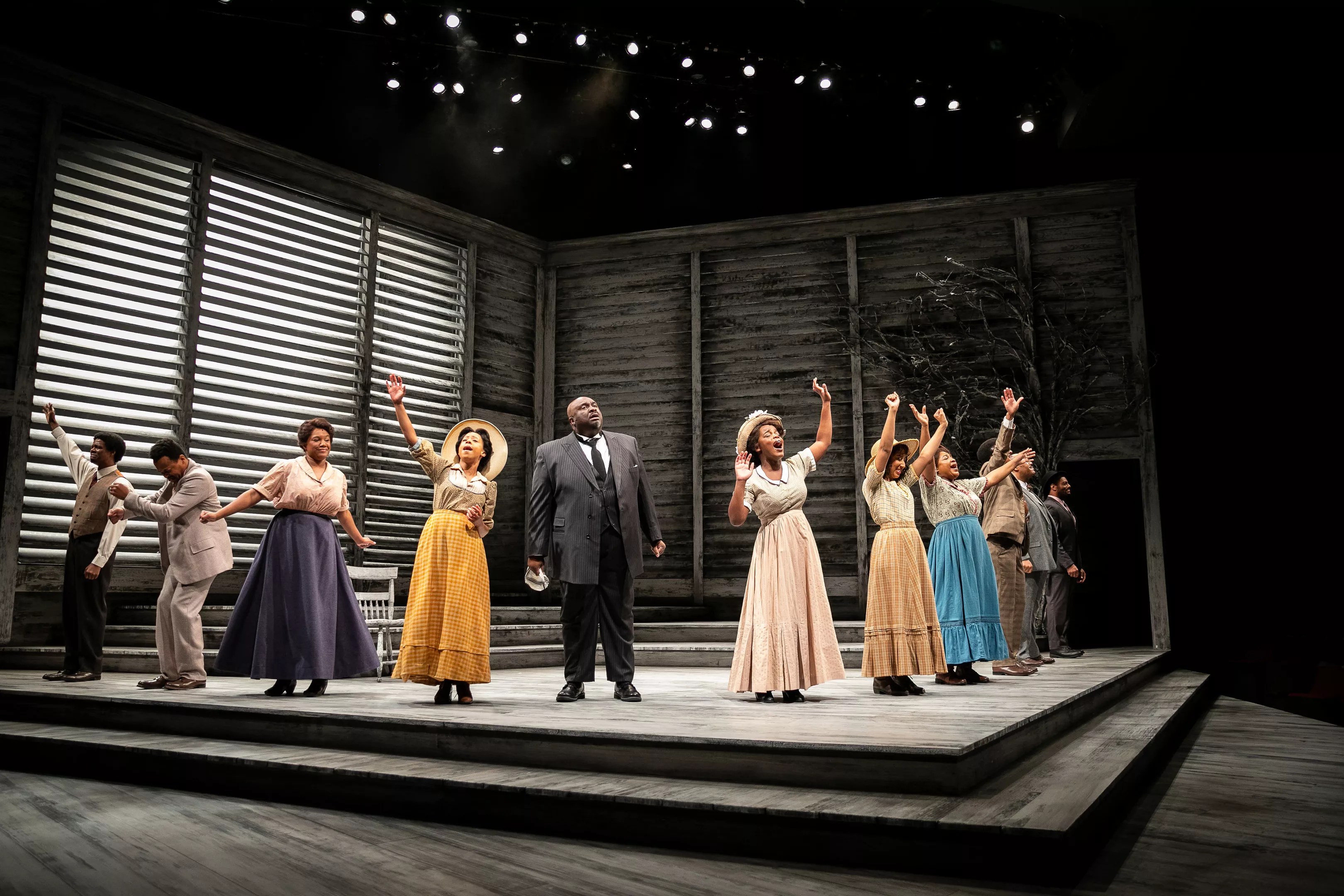
The cast of The Color Purple performs on the Wolf Theatre stage at the DCPA.
Photo Courtesy of Jamie Kraus Photography
“The challenge of the production is making it seem like everything is coming out of Celie’s imagination,” says Douglas. “When you make it three-dimensional, add a bunch of people on stage and introduce conventional musical-theater elements, it can pull focus from the story. So everything is geared toward making the audience feel as though they are witnessing a conversation between Celie and God.
“Given the events of Celie’s life, she is shut down when we first meet her, so the environment as people enter the theater is very closed off,” he continues. “The set is made of weathered wood with withered vines. Yet, as the musical continues and there are moments of evolution, the set reveals itself, and light literally comes shining through cracks in the set.”
Portraying the character of Celie requires a powerhouse performer who is able to play the character at a variety of ages and emotions over the course of forty years. Douglas envisioned Maiesha McQueen, an Atlanta native who has appeared on Broadway, in the role of Celie after working with her on the Portland production.
“During our previews in Portland, while I was watching her play Sofia, I realized that she would make an excellent Celie,” says Douglas. “She is a kind, generous performer who has energy pouring out of her. We knew we needed to bring a cast together who could match her energy. And while everyone in the cast has their own specialties, they all beautifully complement the production.”
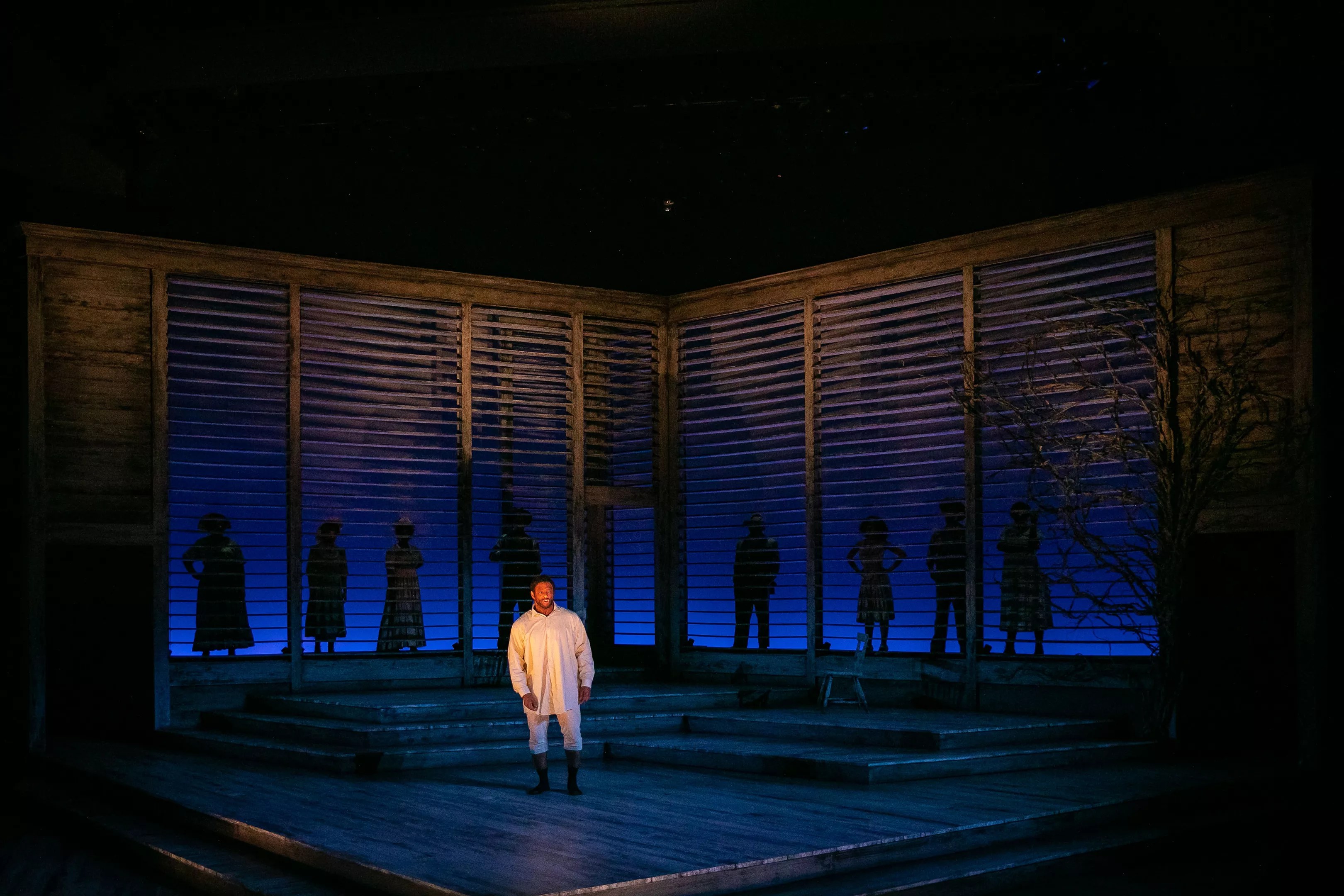
David Aron Damane stands center as other members of the cast stand behind the Color Purple set.
Photo Courtesy of Jamie Kraus Photography
The Color Purple‘s choreography leaned into the individualized abilities of each performer rather than focusing on unifying movements. “In some musicals, like A Chorus Line, everything has to be uniform and look as precise as possible despite the uniqueness of the bodies in the room,” says choreographer Lady Dane Figueroa Edidi. “With this musical, I was able to work in collaboration with the artists based on our shared cultural memories to find different ways of moving.”
The musical’s movements are rooted in Black cultural dances and intentionally paired with the lyrics. “There is no separation between the acting, dancing and singing,” says Edidi. “They are all rooted in the emotional reality of the character. It is an honor to work with performers who have such a high level of musicality that they bring to the music and words.”
Along with music director S. Renee Clark, whom Edidi describes as “brilliant,” the creative team has been working with the cast and crew of The Color Purple to finalize the show during its preview period. Tickets for the musical are available at a reduced rate during the preview process, while the show is still in development, before its opening night on Friday, April 7. After the premiere, tickets will fluctuate in price based on availability during its run through May 7.
While the creative team hopes everyone enjoys the musical, the true desire is for audiences to recognize that the story of The Color Purple doesn’t end when the performances conclude.
“We have Celies, Sofias and Squeaks living among us in 2023,” says Edidi. “I hope people acknowledge that we have a country full of Black women and use their frustration at the injustices that happen in the musical to support Black women across the country. We need to make the world a place where the Celies of the world are able to be honored, loved and accepted without being impeded by violence.”
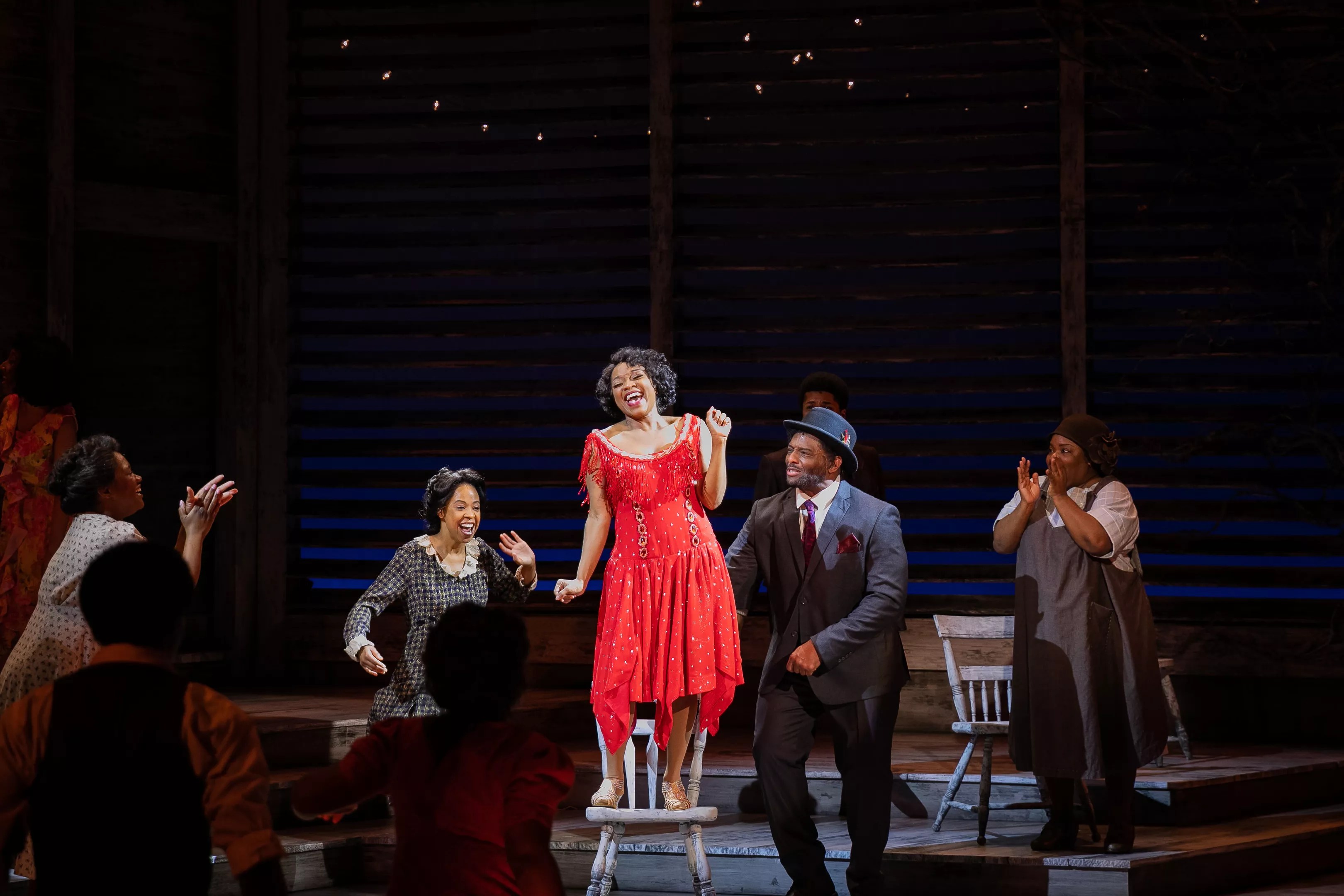
Domonique Paton, Angela Wildflower and David Aron Damane in The Color Purple.
Photo Courtesy of Jamie Kraus Photography
The Color Purple opens on Friday, April 7, and runs through May 7, Denver Center for the Performing Arts, 1101 13th Street. Find tickets, times and more information here.